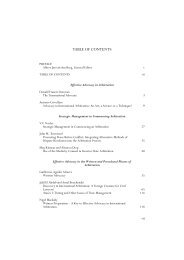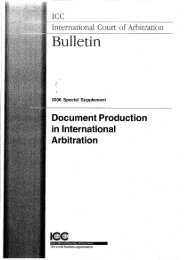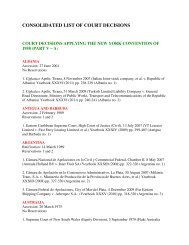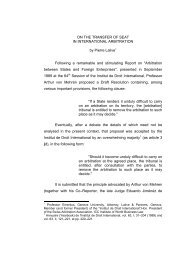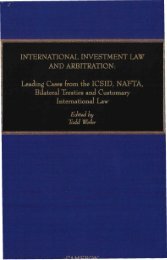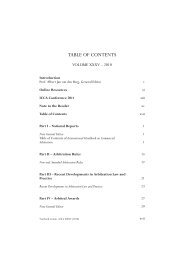Limits to Party Autonomy in International Commercial Arbitration
Limits to Party Autonomy in International Commercial Arbitration
Limits to Party Autonomy in International Commercial Arbitration
You also want an ePaper? Increase the reach of your titles
YUMPU automatically turns print PDFs into web optimized ePapers that Google loves.
parties counsel (who may be busy with other matters and not as diligent as they should be with the subject<br />
arbitration) then the compulsion for accept<strong>in</strong>g the parties' agreement is much less compell<strong>in</strong>g.<br />
The parties' agreement must be evaluated by the tribunal <strong>in</strong> the light of its own obligations and duties.<br />
The primary duty bear<strong>in</strong>g upon the problem we are consider<strong>in</strong>g, is the arbitral tribunal's obligation <strong>to</strong><br />
proceed with diligence and expedition. This is a duty <strong>to</strong> be taken with seriousness but is not necessarily<br />
determ<strong>in</strong>ative of the question at hand. Where the parties' agreement for extra time is predicated on<br />
substantial and significant considerations such as pend<strong>in</strong>g settlement negotiations or the results of a<br />
related arbitration or court proceed<strong>in</strong>gs, then it might well be thought that the duty of the arbitral tribunal<br />
<strong>to</strong> proceed with expedition should take second place. After all the obligation <strong>to</strong> proceed with expedition<br />
largely exists for the benefit of the parties themselves and if the parties have good reason for not wish<strong>in</strong>g<br />
<strong>to</strong> proceed quickly, it is difficult <strong>to</strong> see why the arbitral tribunal should force them <strong>to</strong> do so. However<br />
where the motivation of the request for extra time is predicated on the convenience of counsel, the<br />
obligation <strong>to</strong> proceed with diligence would exist as a strong and perhaps compell<strong>in</strong>g fac<strong>to</strong>r.<br />
The arbitral tribunal is also entitled <strong>to</strong> consider its own position. The members of the tribunal may wish<br />
<strong>to</strong> f<strong>in</strong>ish the arbitration relatively quickly, so as <strong>to</strong> proceed with other work and obta<strong>in</strong> payment of their<br />
fees. But if this <strong>in</strong>terest is weighed aga<strong>in</strong>st the <strong>in</strong>terest of the parties seek<strong>in</strong>g extra time on account of<br />
settlement negotiations or other substantive fac<strong>to</strong>rs, the arbitra<strong>to</strong>rs' <strong>in</strong>terests should give way. What of a<br />
slightly different situation? Let us assume that the parties have agreed <strong>to</strong> extend the date for submissions<br />
not by n<strong>in</strong>e months but by, say, three years. Here the <strong>in</strong>terests of the arbitra<strong>to</strong>rs may be more significant.<br />
When accept<strong>in</strong>g appo<strong>in</strong>tment as members of the tribunal, the arbitra<strong>to</strong>rs would have contemplated an<br />
arbitration run accord<strong>in</strong>g <strong>to</strong> usual practices. Periods of several years, for the tak<strong>in</strong>g of procedural steps, is<br />
extraord<strong>in</strong>ary and would have been outside the contemplation of the tribunal. The members of the<br />
tribunal may not wish <strong>to</strong> be <strong>in</strong>volved <strong>in</strong> an arbitration which would extend over an <strong>in</strong>ord<strong>in</strong>ately long<br />
period of time and could well consider their own position <strong>to</strong> be significant when weighed aga<strong>in</strong>st that of<br />
the parties.<br />
Let us consider a different scenario. Let us assume that the parties have agreed, not on an extension of<br />
time for the provision of a submission, but on the time required for a hear<strong>in</strong>g. Let us further assume that<br />
the case <strong>in</strong>volves an arbitration under the ICC Rules where the arbitra<strong>to</strong>rs are paid on an ad valorem basis.<br />
In our hypothetical situation let us assume that the parties have agreed that there will be brief memorials,<br />
no witness statements but a long hear<strong>in</strong>g of say 12 months. ICC arbitrations typically <strong>in</strong>volve relatively<br />
short hear<strong>in</strong>gs and <strong>in</strong>stead there are extensive memorials and the provision of evidence prior <strong>to</strong> the<br />
hear<strong>in</strong>g <strong>in</strong> the form of production of documents and witness statements. However <strong>in</strong> our example the<br />
parties have chosen <strong>to</strong> arbitrate upon the basis of a traditional common law trial where all the evidence is<br />
<strong>in</strong>troduced at the hear<strong>in</strong>g and where oral submissions are made at the same hear<strong>in</strong>g.<br />
Legal\103364080.1 12



